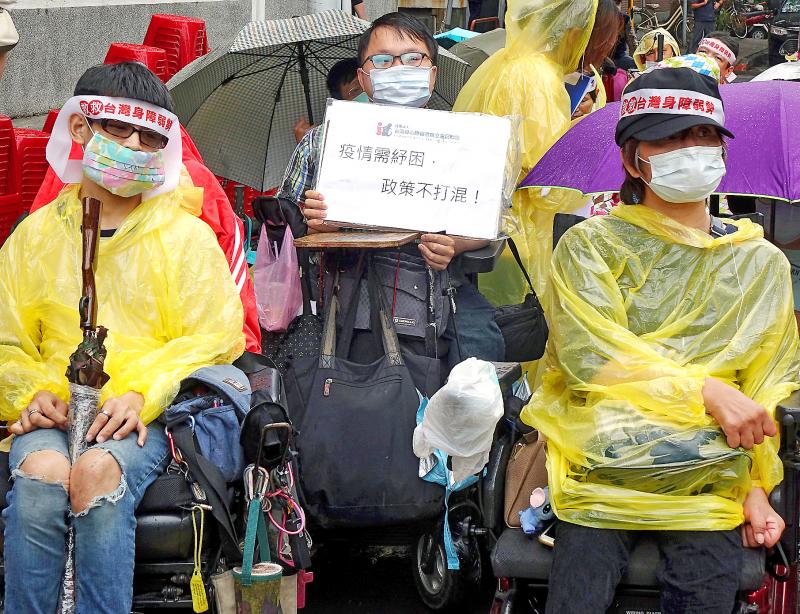Rights groups yesterday rallied in front of the Legislative Yuan in Taipei, urging the government to issue a monthly subsidy of NT$10,000 to each person with a disability so that they could maintain a normal life amid the COVID-19 pandemic.
“The 1.18 million people with disabilities are among the most disadvantaged groups in Taiwan, but are also the most ignored,” said Cheng Long-shui (鄭龍水), a blind rights advocate who was a New Party legislator from 1996 to 2002.
Cheng, convener of the Save the Disabled and Disadvantaged in Taiwan Action Coalition, led nearly 50 people with disabilities in the rally.

Photo: Chu Pei-hsiung, Taipei Times
People with disabilities have been among the worst affected by the pandemic and are in desperate need of the government’s support, he said, before getting on his knees in the directions of the Presidential Office Building, the Executive Yuan and the legislature.
While the government has instituted relief policies, people with disabilities do not meet their requirements, said Chinese Culture University Department of Political Science professor Lin Chung-shan (林忠山), who hosted the rally.
The coalition is making the simple request of monthly cash handouts of NT$10,000 per person with disabilities for six months to help them weather the difficult time, Lin said.
Chinese Nationalist Party (KMT) caucus whip Lin Wei-chou (林為洲), who attended the protest along with other lawmakers from the KMT and the Democratic Progressive Party, said that he hoped the government would dedicate part of approved relief budgets to people with disabilities.
When the jobs of people with disabilities are affected, their family’s lives would also be affected, Lin said, adding that the demographic should be prioritized in the relief schemes.

The manufacture of the remaining 28 M1A2T Abrams tanks Taiwan purchased from the US has recently been completed, and they are expected to be delivered within the next one to two months, a source said yesterday. The Ministry of National Defense is arranging cargo ships to transport the tanks to Taiwan as soon as possible, said the source, who is familiar with the matter. The estimated arrival time ranges from late this month to early next month, the source said. The 28 Abrams tanks make up the third and final batch of a total of 108 tanks, valued at about NT$40.5 billion

Two Taiwanese prosecutors were questioned by Chinese security personnel at their hotel during a trip to China’s Henan Province this month, the Mainland Affairs Council (MAC) said yesterday. The officers had personal information on the prosecutors, including “when they were assigned to their posts, their work locations and job titles,” MAC Deputy Minister and spokesman Liang Wen-chieh (梁文傑) said. On top of asking about their agencies and positions, the officers also questioned the prosecutors about the Cross-Strait Joint Crime-Fighting and Judicial Mutual Assistance Agreement, a pact that serves as the framework for Taiwan-China cooperation on combating crime and providing judicial assistance, Liang

A group from the Taiwanese Designers in Australia association yesterday represented Taiwan at the Midsumma Pride March in Melbourne. The march, held in the St. Kilda suburb, is the city’s largest LGBTQIA+ parade and the flagship event of the annual Midsumma Festival. It attracted more than 45,000 spectators who supported the 400 groups and 10,000 marchers that participated this year, the association said. Taiwanese Designers said they organized a team to march for Taiwan this year, joining politicians, government agencies, professionals and community organizations in showing support for LGBTQIA+ people and diverse communities. As the first country in Asia to legalize same-sex

MOTIVES QUESTIONED The PLA considers Xi’s policies toward Taiwan to be driven by personal considerations rather than military assessment, the Epoch Times reports Chinese President Xi Jinping’s (習近平) latest purge of the Chinese People’s Liberation Army (PLA) leadership might have been prompted by the military’s opposition to plans of invading Taiwan, the Epoch Times said. The Chinese military opposes waging war against Taiwan by a large consensus, putting it at odds with Xi’s vision, the Falun Gong-affiliated daily said in a report on Thursday, citing anonymous sources with insight into the PLA’s inner workings. The opposition is not the opinion of a few generals, but a widely shared view among the PLA cadre, the Epoch Times cited them as saying. “Chinese forces know full well that